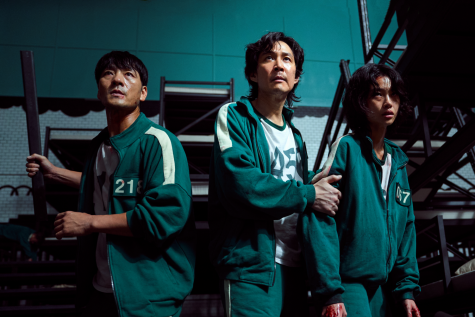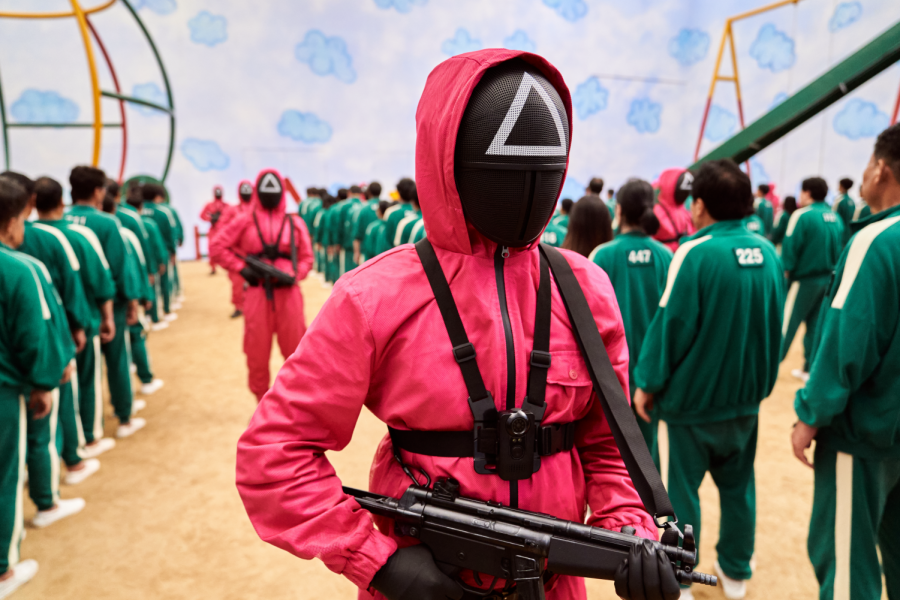It’s the age of streaming. With hundreds of shows and movies released daily, it is hard to imagine that one would stand out from the rest. The idea of yet another show like “Game of Thrones” or “Breaking Bad” that captivates the world seems to be a memory of the past. However, in an unexpected arrival, Netflix’s original series “Squid Game” contradicts the status quo by pulling a diverse audience across a large variety of people, potentially making it the next smashing hit that everyone was waiting for. If you haven’t gotten a chance to watch “Squid Game” yet, the following may contain spoilers.
Whether you have seen it or not, no one is a stranger to the name “Squid Game.” The series was released on Sept. 17 and is currently on track to be the biggest show in the platform’s history. With a rating of 100% on Rotten Tomatoes, the Korean thriller has garnered critical acclaim while captivating millions of viewers around the globe. Although the genre of survival thrillers is nothing new, the South Korean drama stands out amongst others due to its commentary on capitalism, social construct, and a violent study of human nature.
In the show, 456 players must compete in a series of childhood games such as tug of war and of course the titled game “Squid Game” for the chance to win 45.6 billion won (roughly 38 million USD). The stakes are high as most participants are impoverished and in dire need of money. However, there is a wicked twist unforeseen by players: if you lose the game, you lose your life.
The simple childhood games are turned into violent, murderous warfare that may disturb yet intrigue most viewers. The juxtaposition of innocence and evil is a core element to the show and can be attributed to its success. Hwang Dong-hyuk, the writer-director of Squid Game, believes people are attracted to the “simplicity’’ of the games.
“The games are simple and easy, so viewers can give more focus on each character rather than complex game rules,” Hwang said in an interview with BBC News.

The series primarily follows Seong Gi-Hun (also known as Player 456) played by Lee Jung-jae as he navigates the games and fights for his life. We are first introduced to Gi-Hun as a divorced, degenerate gambler. He is a neglectful father on the run from the mob who survives by mooching off his elderly mother (whom he occasionally steals from). After the mob confronts him about his debt, a beaten Gi-Hun is approached by a mystery man in the subway station. In what seems like a miracle, Gi-hun is offered the ability to pay off his debt if he participates in a series of games. Hesitant but desperate, Gi-Hun agrees and thus begins the games.
Within the first 20 minutes of the pilot episode, you will be hooked. The characters are diverse and keep the audience intrigued. All are marginalized members of society searching for a better life, a concept many can relate to no matter what country you live in. There is strong commentary on capitalism and the way it has caused a divide in society. The contestants in the show are tortured and killed for the game master’s entertainment. However, instead of fighting the real enemy (the wealthy) the poor succumb to their inevitable fate and turn on each other. With so much cruelty, one may wonder why any of the participants would stay.
The prize may seem worthless after witnessing the inhumane torment required, but the players make it clear that their reality outside the game is just as hopeless. Society has neglected these people, stripping away any opportunity for a better life. With nothing to lose, the players are willing to risk their lives with an ounce of hope. One of the gaming officials clarified the appeal saying “All participants in the game are equal. We are giving people who have suffered unequal treatment and discrimination in the outside world the last chance to win a fair competition.”
The show tests the idea of survival in the most intense and grotesque way imaginable. The players, whose lives mirror the next, are willing to do anything to win, with many becoming merciless killers with no remorse at the expense of success. The psychological warfare is so outrageous yet feasible to our modern society, giving a more haunting thrill that will leave a pit in your stomach. What begins as a game soon becomes a war that grows outside the playing field and into the personal lives of the players. “Squid Game” gives the harsh reality that even the best of us can succumb to utter violence and evil if the price is right.
After watching the show, it’s easy to come to the realization that all the things we glorify as a society, including wealth and power are mere illusions given the consequences they bring. The show perfectly depicts this feeling of emptiness that comes with success and will make the viewer reconsider what is valuable in this life.
There is a reason “Squid Game” has skyrocketed in popularity and has gathered a cult following. The show reflects what we all strive for in a world that only favors the few. With money comes greed and with power comes disconnect, a concept that is explored extensively throughout the series. At the rate “Squid Game” is currently going, it seems that this show is here to stay and one we will be talking about for a while.







